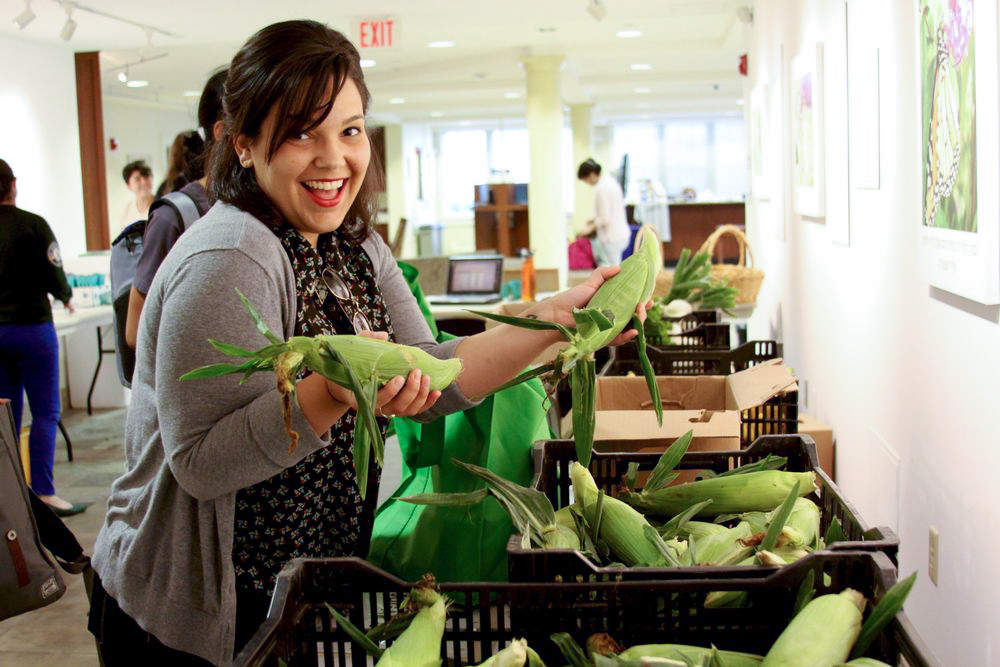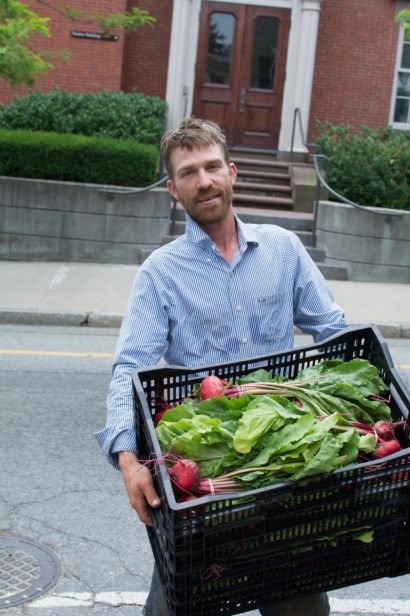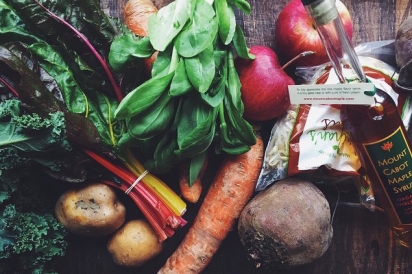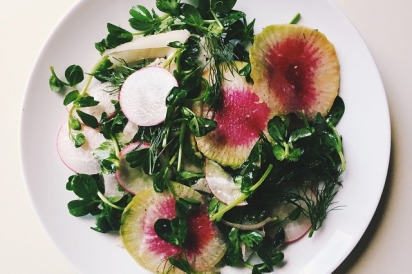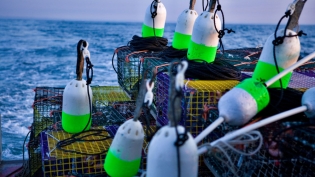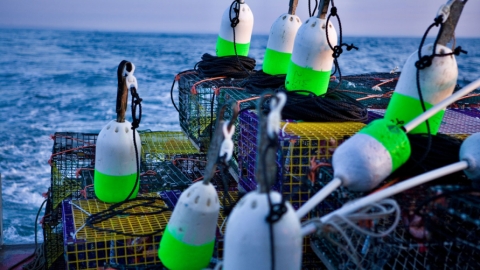Brown Market Shares: Student-Driven, Student-Run
In preparation for the upcoming school year, Edible Rhody made a visit to the Brown Market Shares Program to find out everything you need to know about this unique student-run CSA program. Brown Market Shares offers access to fresh Rhode Island–grown produce to the Brown community, connecting students, faculty and staff to the best bounty Rhode Island has to offer.
We chatted with Maddy Rotman and Estelle Berger, two of the seven-member coordinating board, about the amazing effects this program has had on campus and off, plus its future goals.
. . .
Tell me about Brown Market Shares and how it got started.
Maddy: Brown Market Shares Program is a student-run food distribution program that connects local farmers and producers to the university community. You must be a member of the Brown community to take part—so that means students, faculty members and staff. We provide access to fresh local produce grown in Rhode Island. Buying local helps strengthen the local economy too. We also want to make sure that all members of the Brown community have access, whether you are a grad student on loans, or whether you are an undergrad receiving financial assistance.
Estelle: Just to give some history, Brown Market Shares was started in 2006 by a group of Brown students. Originally it was designed to provide fresh local produce to people who work in the cafeteria, the idea being to feed the people who feed us by offering them the excess produce from the Wriston Quad Farmers’ Market (which runs weekly in the fall). We have a pretty sizable subsidized program. Providing for Brown community members who do not have access to locally grown food is the whole overarching goal of Market Shares, plus maintaining relationships with farmers and shareholders as a result.
Maddy: Rhode Island has some of the most expensive farmland in the nation, making it difficult to be a farmer here. So to feel like we can support their endeavors and support the local space through the university, that’s pretty incredible. At Brown, we are a large group of people who care, so if we can connect local producers with local eaters, we feel really great about that.
Can you explain more of the day-to-day workings of the program?
Maddy: The logistics of Market Shares are easy. You simply sign up for a season ahead of time, and the seasons run based on semesters (fall, spring and summer). There are about 10 to 11 weeks in each season, and you pay in advance. Payment plans are available too.
Pickups are every Thursday at Hillel House (we also just expanded pre-packed shares available for pickup at the Medical School in Providence’s Jewelry District) and you grab your pre-planned share. For the Jewelry District, volunteers at the Market Share select items and pack them for shareholders to just grab a completed package of produce. At Hillel, shareholders come in and choose each item out of each basket.
You choose from baskets of produce, around eight to nine items per week, and you can also add bread, milk, eggs, yogurt, cheese and meat, all from local producers. So the bread is from Seven Stars Bakery, the meat from Pat’s Pastured, Narragansett Creamery cheese and yogurt. We also just started offering bi-weekly yogurt shares from Sweet & Salty Farm. We’re working with new people all the time to try to get those relationships going!
So how do you get in contact with the producers?
Estelle: To back up a little, the leadership structure of Market Shares is a seven-person coordinating team. We do not have one president, we have seven people who each have different roles. I’m the subsidized coordinator, there is a finance coordinator, Maddy is communications, there is PR, program development, a purchasing coordinator and operations manager. So the purchasing coordinator reaches out directly to the farms. We have long-standing relationships with a lot of these farms, but as Maddy said, we’re always starting new things as well.
Maddy: We have been working with many producers for so long that I don’t even know how the relationships began. But some farms are also small and new to us, and our quantities are so large that they only bring in produce for us once or twice per year. But there are also other farmers that plant produce specifically for Brown Market Shares. There is also a strong, supportive farm network in Rhode Island. A farmer might tell us, “This new farm is across the way, you should talk to them!”
How do you see Brown Market Shares benefiting the larger Rhode Island community?
Maddy: Farmers and producers have said that knowing they are going to get a consistent check from us, or knowing that they are going to get consistent purchasing, helps them a great deal. Some farmers say, “You saved us in a really hard time. We didn’t think we’d make it through the winter.” So there have been amazing experiences like that, where certain farmers have really shown that Market Shares has affected their business. It’s pretty amazing to think that seven students running this student program actually does effect change, and that we care about local producers while they care about us. So if each shareholder gets two pounds of potatoes, that’s 800 pounds in the fall that a farmer knows they’ll be able to sell.
What kind of produce do you usually get?
Maddy: Prospective members can visit our website where there’s a mock share for each month, so you can see a list of what to expect any given month. For example this week (mid-August) we’re getting celery, sweet potatoes, onions, salad greens, zucchini squash and garlic.
Estelle: We also receive specialty items, so we will include honey, granola or salsa in the share. And then, usually towards the end of the season, we sell whatever extra items we have.
Maddy: Those add-ons make it really fun, because you get to see the other side of production that is happening in the state, besides produce. So we have offered honey from Little Compton, or granola from the Granola Project. This year was really amazing, we had a farm reach out to us from New Hampshire that wanted to sell us maple syrup. She left at 5 am to get it to us by 11 am. It was so delicious!
How are you trying to expand this model to communities outside of Brown?
Maddy: Two coordinators who just graduated, who worked for Market Shares for a few years, received a fellowship grant one summer to write a Market Shares book, a very intensive overview of the structure of Market Shares. This book became a promotional piece of information that we can use to help other schools look at our model and use what elements will work best for them. We would really love to make school outreach a bigger project.
Estelle: Nine years later, Market Shares has really become a part of the Brown culture. And on Thursdays it’s so exciting to walk around campus and see people with their Market Shares bags with fennel sprouting out. It definitely is a source of pride. I think that when people walk into the Market Shares space, it’s just so happy and relaxed and communal. You have professors and grad students and undergrads all milling about together, and it is really special to be a part of it. And I have been a part of it since I arrived at Brown, first as a volunteer and now as a coordinator.
Maddy: I feel the same way. And I feel very lucky to be on the coordinating team, and to get the experience from this side of it too. And it’s really nice to be known as the Market Shares people—I’ll be in class and someone will say, “I made the best lunch today, thank you!” and will tell me what they made for lunch—I love that.
Estelle: And people send us photos of things they make with the shares. Plus, the majority of shares are shared between two or more people. So say an average autumn has 400 shareholders, our actual reach is to about 900 people.
What about the volunteer system? How can people get involved?
Estelle: Market Shares is run all by volunteers, and we often have a waiting list of people. Every hour we have a new set of volunteers come in, usually between three and five volunteers, and one shift leader works for two-hour shifts. It’s really cool to see how invested they are as well. They each have their own style and their own skills.
Maddy: It’s more physical than your day-to-day stuck-in-a-book work. I’m really proud that Market Shares can be solely run by students. We don’t have an academic adviser—we’re completely student run by the seven of us. Every week thousands of vegetables get delivered to people and it all works. That’s pretty empowering how that all can happen, and that it can have such an impact on Rhode Island as well.
A huge thank you to Maddy and Estelle for taking the time to chat with us!
For more information on the Brown Market Shares Program, visit their website at BrownMarketShares.com, where you will find information on sign-up, a produce guide and overall Market Shares information.


